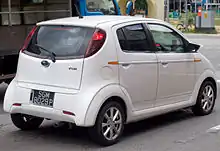Subaru R2
The Subaru R2 was announced in Japan on December 8, 2003, and the R2 name was inspired by the Subaru R-2, the kei car model that was produced between 1969 and 1972.
| Subaru R2 | |
|---|---|
 | |
| Overview | |
| Production | 2003 - 2010 |
| Body and chassis | |
| Class | Kei car |
| Related | Subaru R1 |
| Powertrain | |
| Engine | 658 cc (40.2 cu in) EN07U Inline 4 658 cc (40.2 cu in) EN07D DOHC AVCS Inline 4 658 cc (40.2 cu in) EN07X DOHC Inline 4 supercharged (STi) |
| Transmission | 5-speed manual iCVT |
| Dimensions | |
| Wheelbase | 2,360 mm (92.9 in) |
| Length | 3,395 mm (133.7 in) |
| Width | 1,475 mm (58.1 in) |
| Height | 1,520 mm (59.8 in) |
| Curb weight | 880 kg (1,940.1 lb) |
| Chronology | |
| Predecessor | Subaru R-2 (spiritually) Subaru Pleo (first generation) |
| Successor | Subaru Lucra Subaru Pleo (second generation) |


Design
The R2's exterior reflects influence from Andreas Zapatinas, who worked at Alfa Romeo before moving to Subaru. The R2 is the first production Subaru to sport a new family look, including the aviation-inspired "spread wings grille"[1] that is also used by Tribeca and Impreza.
The R2's exterior dimensions are largely similar to its predecessor, the Subaru Pleo, but unlike the squarish Pleo, the R2 is deliberately rounded, less space efficient form.
Three variations of the 4-cylinder, 658 cc engine are available:
- SOHC
- DOHC AVCS (variable valve timing)
- DOHC with supercharger and intercooler (R2 STi)
Unlike other Subaru models which use Boxer engines, the R2 uses an inline engine.
The two lower engine options are available with either a manual transmission or a CVT. The supercharged engine is coupled to a sportshift version of the CVT ("7 speed iCVT"). Both front wheel drive and all wheel drive are available.
Initially, the R2 was available in 11 colors and 3 trim levels (one for each engine variation).
On January 4, 2005, the Subaru R1 was introduced, a 2-door version of the R2 with a shorter body and wheelbase.
In 2006, the R2 got a facelift that is a similar design to Subaru Legacy's grille, removing Tribeca-style front grille.
The Subaru R2 is also a playable secret car in Wangan Midnight Maximum Tune.
The R2 was discontinued in March 2010.
References
| Wikimedia Commons has media related to Subaru R2. |
- Dan Neil (October 31, 2007). "Soft-serve Subie". latimes.com. Retrieved 2008-04-11.
